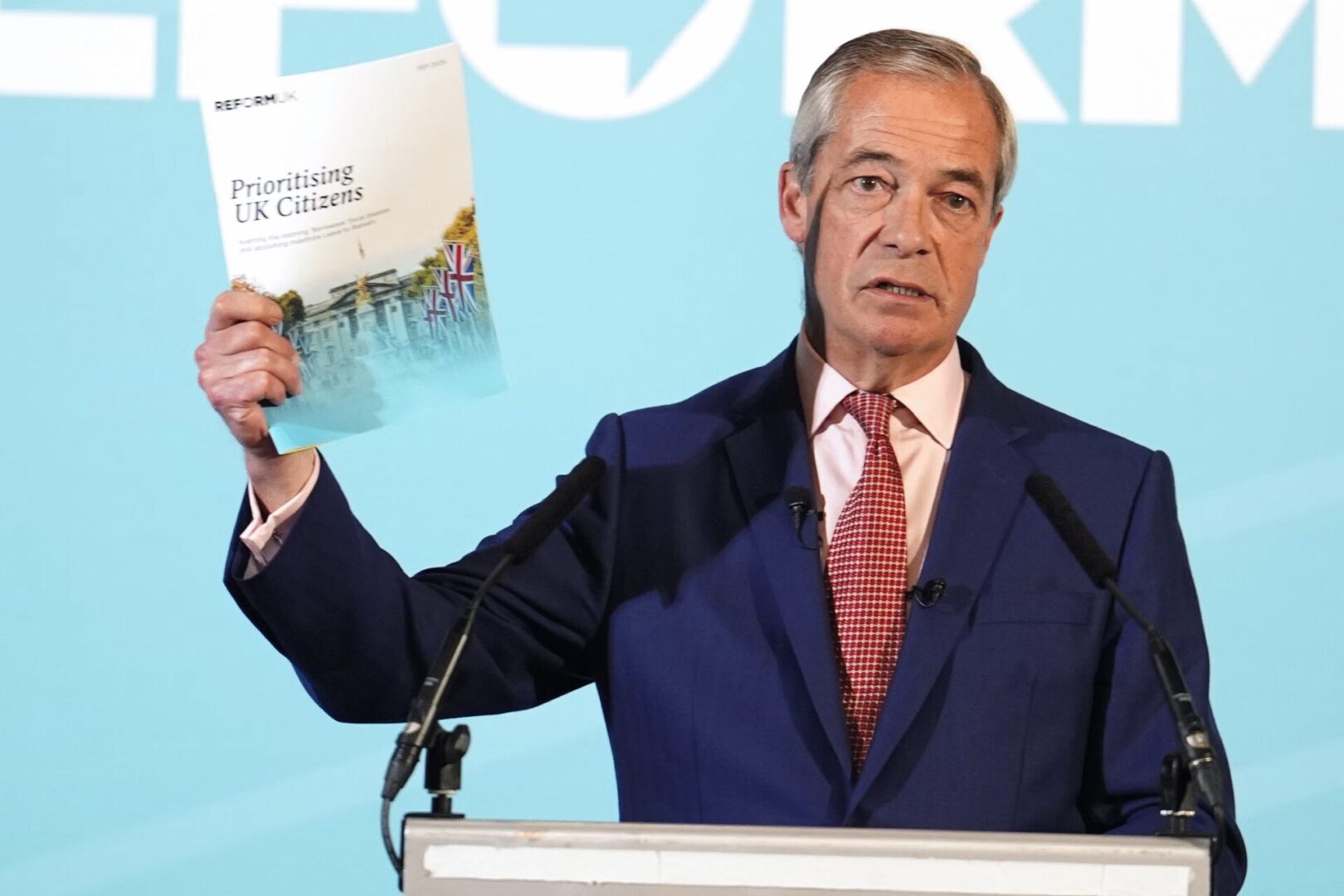Reform UK Pledges to Scrap Indefinite Leave to Remain, Putting 430,000 Migrants’ Status at Risk
Jamaica Live International News– | Sept 22, 2025
Nigel Farage and Reform UK say that if they win the next UK general election, they will abolish Indefinite Leave to Remain (ILR)—the status that lets migrants settle in Britain permanently. In its place, Reform proposes a renewable five-year visa with tougher rules (higher salary thresholds, no access to most benefits, and stricter English requirements). Crucially, existing ILR holders would be forced to reapply under the new system, according to multiple briefings and reports published today.

Reform figures have also suggested EU citizens with “settled status” under the EU Settlement Scheme (EUSS) would not be affected, a carve-out that reflects protections in the EU-UK Withdrawal Agreement.
How many people are we talking about?
As of the end of 2024, an estimated 430,000 non-EU citizens held ILR in the UK, per the Migration Observatory at the University of Oxford (this estimate excludes EU nationals with EUSS settled status).
To put today’s system in context:
- What ILR is: Once granted, ILR removes time limits on stay and is the UK’s core “permanent residence” status. GOV.UK
- How people get it: Most work-route migrants become eligible after five years; family-route migrants are also a large share of new settlers; asylum/resettlement and special schemes (e.g., BN(O), Ukraine) contribute too. In 2024, 167,621 people were granted settlement (ILR), with especially high shares from family and work routes. GOV.UK
Beyond current ILR holders, the Migration Observatory notes that about 53% of people on temporary visas at end-2024 (≈2.1 million) were on paths to settlement—groups who would also face upheaval if the goal is to eliminate future ILR. Migration Observatory
What Reform UK says it would change
- End ILR entirely and require 5-year renewals for everyone who is not a UK citizen.
- Raise salary thresholds substantially (reports have cited figures around £60,000), far above today’s median pay—further limiting eligibility.
- Curtail access to benefits for non-citizens, limiting welfare to citizens only.
- Possibly extend citizenship timelines and tighten dual-citizenship rules (details remain fluid).
These proposals land against a backdrop of falling net migration (ONS provisional estimate 431,000 in YE 2024, down from 860,000 a year earlier) and a separate Government white paper this summer signalling longer qualifying periods for ILR (e.g., moving many routes from 5 to 10 years), not abolishing it.
Who would be affected—and who likely wouldn’t
Likely affected if Reform wins and legislates as briefed:
- Non-EU ILR holders (e.g., from Jamaica and the wider Commonwealth), who could be told to re-apply for a new 5-year visa with higher salary/English thresholds and reduced entitlements.
- People on settlement tracks (work, family, long-residence) who expected ILR in the next few years; their path could be blocked or converted into renewals. Migration Observatory

Less likely to be affected:
- EU citizens with EUSS settled status (rights protected under the Withdrawal Agreement), which grants permanent residence after five years and is separately safeguarded in UK law. Reform has publicly hinted at an exemption here, and legal protections back that up.
Could Reform actually do it? Legal and practical hurdles
- Retrospective change to acquired rights
Stripping or converting ILR for people who already met the rules raises legitimate expectation and proportionality issues under UK public law, and could trigger claims under the European Convention on Human Rights (family/private life) and the Equality Act (indirect discrimination). MPs from across parties have recently warned against moving goalposts for those already here. - International obligations
The Withdrawal Agreement protects EUSS residents; any attempt to fold them in would collide with treaty law, and even Reform’s own briefings imply a carve-out. House of Commons Library - Economic disruption
Health and care, construction, agriculture, hospitality and higher education all rely on long-term migrant staff. Professional bodies and economists argue abolishing ILR would hurt recruitment and retention, particularly as the UK already raised thresholds in 2024/25. - Administrative feasibility
Converting hundreds of thousands of ILR records into a renewable-visa regime would create a mass processing surge for the Home Office—already stretched—and a wave of appeals/litigation. (Even routine rule changes require extensive transition arrangements, as seen in the government’s own impact assessments.) GOV.UK Assets
What this could mean for Jamaicans and other Commonwealth nationals
Jamaicans form one of Britain’s best-known diaspora communities—multi-generational, deeply rooted, and vital in the NHS, care, transport, education and public services. Under Reform’s blueprint:
- Long-settled parents and grandparents with ILR could face renewal bureaucracy, higher income bars and reduced safety nets—despite British children and decades of contribution.
- Care workers and NHS staff (where Commonwealth nationals are prominent) become harder to retain if their long-term security is downgraded to revolving visas. Unions warn of service impacts.
- Students and workers on routes that once led to ILR would lose the “permanence horizon” that encourages investment in skills, home-ownership, and community life. The Migration Observatory emphasises how settlement pathways shape integration and long-term planning. Migration Observatory

“Will I lose my ILR overnight?”
Even if Reform formed a government, laws must pass Parliament, and complex transition rules would be expected. Courts would likely scrutinise any attempt to void existing ILR without fair alternatives. Today, ILR remains valid—you keep it unless you leave the UK for over two years (or commit serious offences leading to deprivation). GOV.UK
Practical steps ILR holders can consider now (not legal advice)
- Check citizenship eligibility.
Many ILR holders can naturalise after 12 months (sooner if married to a British citizen). Citizenship brings voting rights and removes immigration control altogether. (Official guidance routes remain in place; separate from Reform proposals.) - Keep your status proof up-to-date.
The Home Office is moving to eVisas. If you have ILR but no digital proof, consider a No Time Limit (NTL) eVisa application. GOV.UK - Mind the absences.
Don’t be outside the UK for 2+ years without securing a Returning Resident plan. GOV.UK - Family routes & long residence.
If you’re close to qualifying under 5-year work/family or 10-year long-residence rules, get documents in order early. Official stats show many apply as soon as eligible. GOV.UK - If you’re EU/EUSS:
Your status is anchored in the Withdrawal Agreement. The Commons Library notes permanent residence after five years is treaty-protected. House of Commons Library
The politics and the numbers behind Reform’s claim
Reform argues scrapping ILR and tightening routes will save £230bn+ and end “cheap foreign labour.” Economists and the original think-tank analysis widely dispute those savings, noting that migrants on average contribute positively to the public finances and that sudden rule shifts risk labour shortages.
Meanwhile, official data show net migration already halved in 2024, partly due to earlier rule changes (salary thresholds, care-worker restrictions, family minimum income). That trend undermines the case for extreme shock therapy. Office for National Statistics+1
Bottom line for Jamaica Live readers
- Nothing has changed yet: ILR remains valid today.
- Reform UK’s plan would represent the biggest shake-up of UK settlement in modern times, with disproportionate risks for long-settled Commonwealth families—including Jamaicans—who have built lives, careers and businesses in Britain.
- Expect legal fights and transition complexities if this ever gets near the statute book—especially around treaty-protected EUSS rights and those already on a promised path to settlement.
